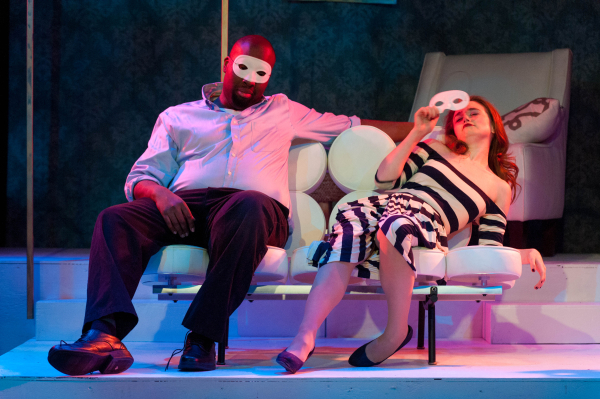
(© Kelly Marsh)
In this Shakespeare-saturated theater season, another Bard-inspired production has sprung up in the Village for half a dozen performances at the Players Theatre. TP&co, a company that specializes in reimagined stagings of Shakespeare, provides a political backdrop to this production of Much Ado About Nothing, couching the comedy in the contentious milieu of American electoral-party bickering. While a provocative idea, comparing warring politicians with Shakespeare's sparring lovers feels forced. Still, if you're not Shakespeare-weary yet, you may find much to like in this production.
Directed by Christian Amato, this Ado begins with a recorded speech by President Barack Obama on the inflammatory topic of the nation's budget and takes place in an American Southern state rather than Shakespeare's Messina (a Don Pedro campaign poster lets us know that we're in the home of a political family). Once the scene is set, the familiar story of two pairs of lovers begins: Claudio and Hero (Claron Hayden and Charlotte Pines) fall in love at first sight, and Benedick and Beatrice (Jonathan Rion Bethea and Brianna Hurley) exchange insults until they're finally tricked into admitting their hidden affections. Intrigue ensues when the mean-spirited Don John (Tyler Nye) conspires to throw Hero's virtue into doubt, and her fiancé, Claudio, renounces her. In true Shakespearean fashion, deaths are faked, wrongdoers are rooted out, the truth is revealed, and order is restored when the two couples are married.
While this Ado has a fun, whimsical feel, there are some missteps that additional rehearsals might have corrected. A few male actors repeatedly thrust their hands uncertainly into their pants pockets between lines, as though unsure what to do with them, and stage exits are accomplished, sometimes clumsily, by unnecessarily circuitous routes. The production also employs, at the beginning of several scenes, piped-in music that frequently drowns out the actors' voices. And later on, when Benedick says to Don Pedro, "I must discontinue your company," he removes a Don Pedro campaign pin from his sweater. At this late point in the play, the audience has forgotten all about the political backdrop, making this stage business feel tacked on.
But TP&co's production has bright spots aplenty. Many of the performances shine: Hurley, speaking with a thick Southern drawl, lends a wonderful humor and elegance to Beatrice, and Bethea delivers a delightfully clownish Benedick. Also of note is Claron Hayden who, while playing the guitar, sings a lovely, stirring rendition of Act 5's "Heavily, Heavily." (As in past productions, TP&co excels with setting Shakespeare to music.) And the troupe's jaunty approach toward the play keeps pace with the fast-moving plot. Dominic Sellers portrays Leonato with verve, and Bridget Dunigan's Dogberry is appropriately bumbling and buffoonish. The talented Eric Fletcher, who plays Don Pedro, co-composed the lovely music with Hayden. I wish there had been more of it.
Given the current state of our government's discord, the production's political backdrop is timely, but in the play's context, it's ultimately superfluous. Much Ado is so breezy that election-campaign motifs weigh the text down and don't inform it in any significant way. Despite that, TP&co offers a cheerful romp through one of Shakespeare's best-loved comedies. Though this production does not fair as well as some of the company's previous efforts (last year it mounted a wonderfully innovative and energetic Midsummer Night's Dream that set much of the play to music and squeezed every drop of humor from the text), it does prove that the troupe is willing to take innovative risks with the material. For that, it gets my vote.








